Focaccia Recipe
This post may contain affiliate links. Read my full disclosure policy.
Learn to make focaccia, the simple Italian flatbread with its signature dimpled surface and rich olive oil flavor—it’s easier than you think!
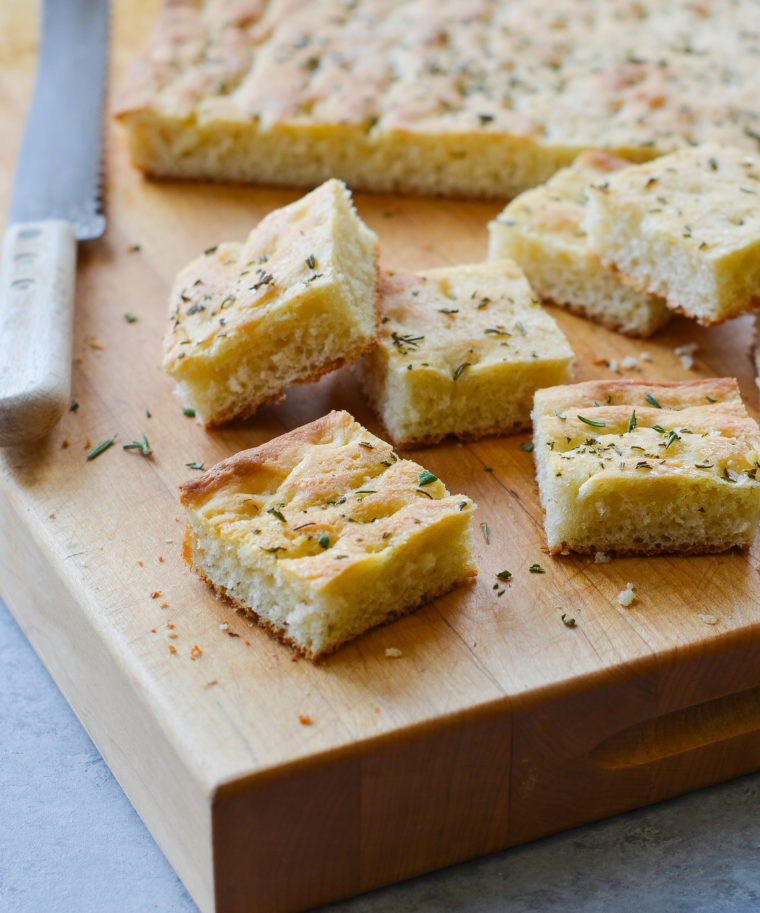
Perfect for feeding a crowd, focaccia is a rich and flavorful Italian flat bread baked in a sheet pan. It’s made with a yeast dough that rises twice: once after it is mixed and then again after it is shaped. To give the bread its signature dimpled appearance, you use your fingers to form little indentations all over the dough. These “dimples” hold tiny pools of olive oil that soak into the bread as it bakes. The recipe calls for about one cup of oil, which I know seems like a lot, but that’s what makes focaccia so good! Note that the oil is added in stages, so be sure to read the recipe carefully before starting so that you don’t accidentally add it all at once.
Adapted from Anne Burrell, this simple focaccia recipe is topped with coarse salt and fresh rosemary, but other toppings can be added, such as thinly sliced tomatoes, cherry tomatoes, olives, caramelized onions or Parmesan cheese, to name just a few. Enjoy the bread warm out of the oven with pasta fagioli, zuppa Toscana, bolognese or a big Italian salad. Leftovers make wonderful sandwiches.
“Thanks for another hit Jenn! I made this for Christmas Eve and it paired perfectly with your classic lasagna.”
What You’ll Need To Make Focaccia
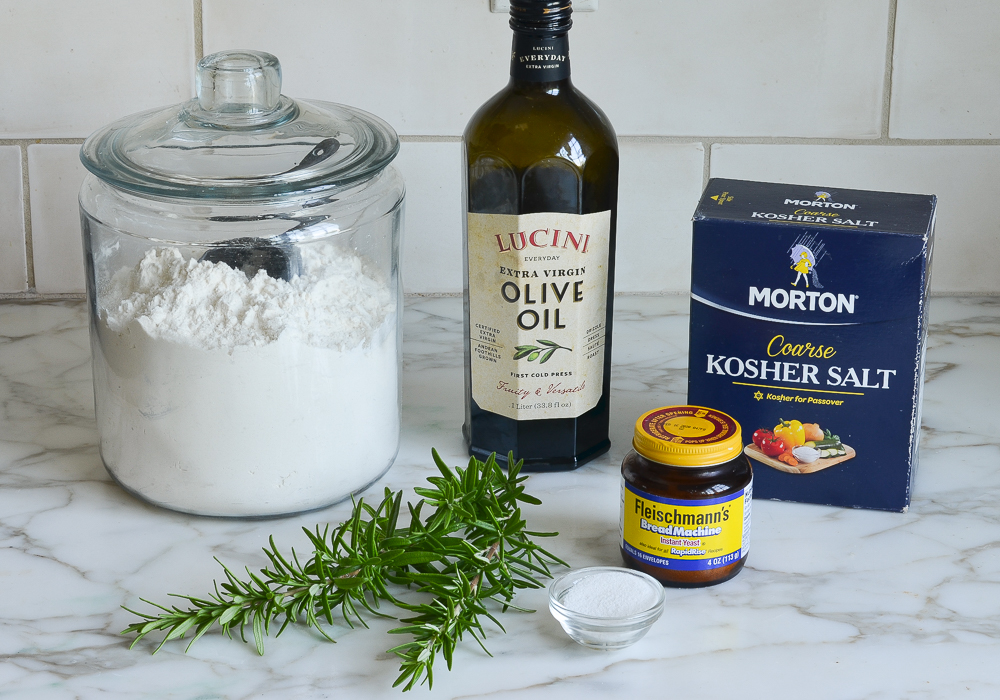
- All-purpose flour: The base of the dough. Be sure to use the spoon and level method—spoon the flour into your measuring cup and level it off with a knife—for accuracy and best results.
- Sugar: Feeds the yeast, helping the dough rise.
- Yeast: Makes the bread rise. I use instant or rapid-rise yeast (sometimes labeled “bread machine yeast”) for focaccia and other yeast breads because it rises much faster than active dry yeast. You can find it in jars or packets, and once opened, it keeps in the fridge for 3 to 6 months. If you don’t bake homemade breads often, I recommend buying the individual packets to ensure freshness.
- Kosher salt: Adds flavor to both the dough and the top of the focaccia.
- Warm water: Activates the yeast and brings the dough together.
- Extra-Virgin Olive oil: Provides richness and flavor while also creating a crispy bottom.
- Fresh rosemary: Adds an earthy, fragrant flavor. Feel free to experiment with other herbs like thyme or oregano for a different twist.
- Jump to the printable recipe for precise measurements
Step-By-Step Instructions
Step 1: Make the Dough
Begin by combining the flour, salt, sugar, and yeast in the bowl of a heavy-duty mixer fitted with the dough hook.
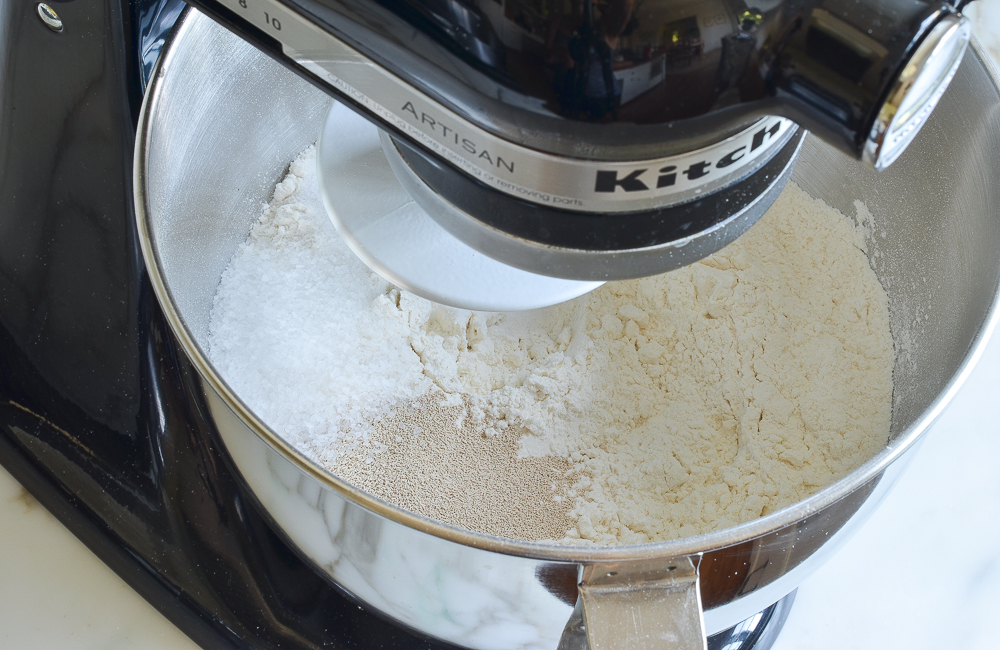
Mix to combine.
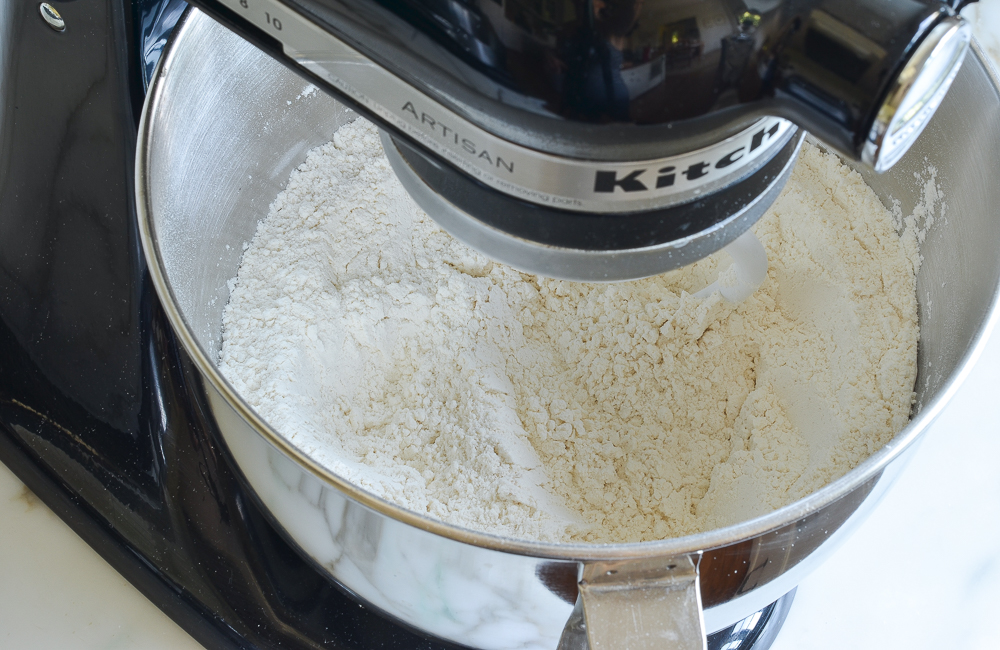
Add 1-3/4 cups warm water and 1/2 cup of the olive oil.
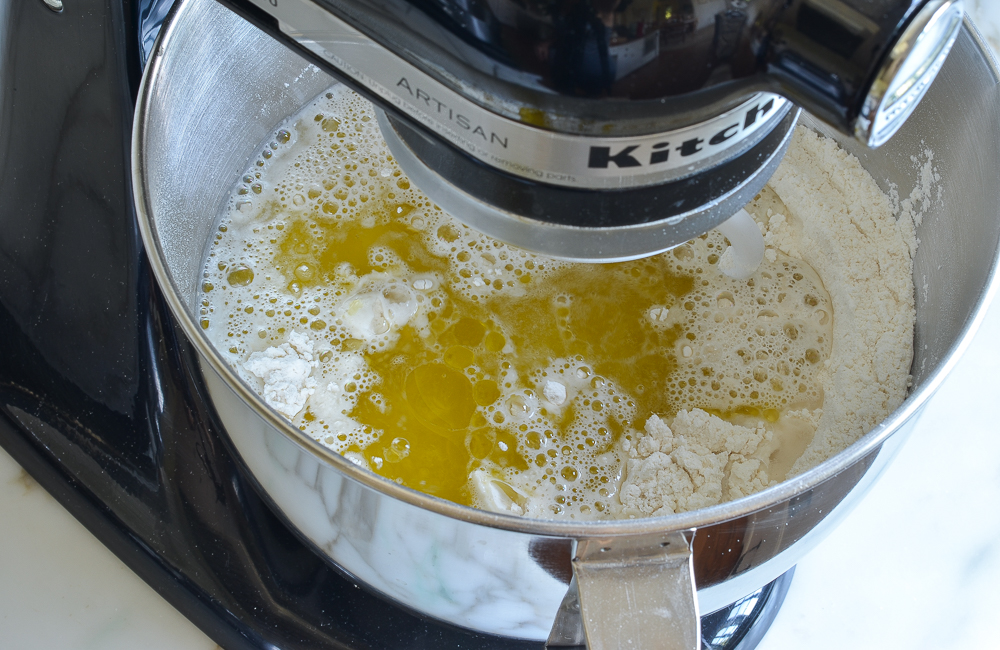
Mix on low speed until the dough comes together into a sticky mass.
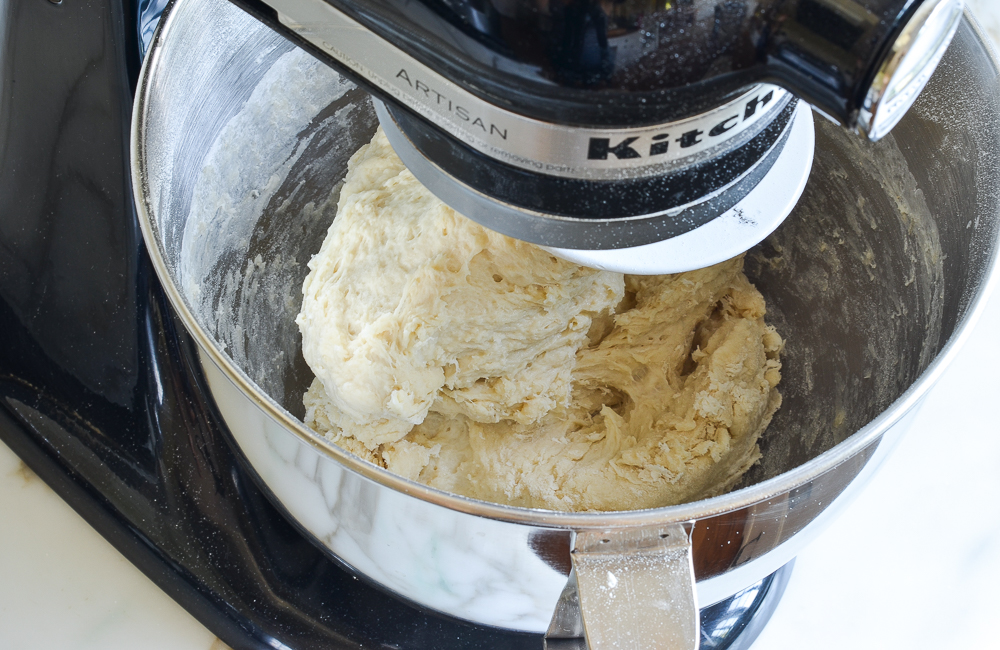
Increase the speed to medium and knead for 5 to 6 minutes, or until the dough becomes soft and slightly tacky. It should stick to the bottom of the bowl a bit. If the dough seems too wet, sprinkle with a few tablespoons of flour, and turn the mixer back on to knead it briefly to combine.
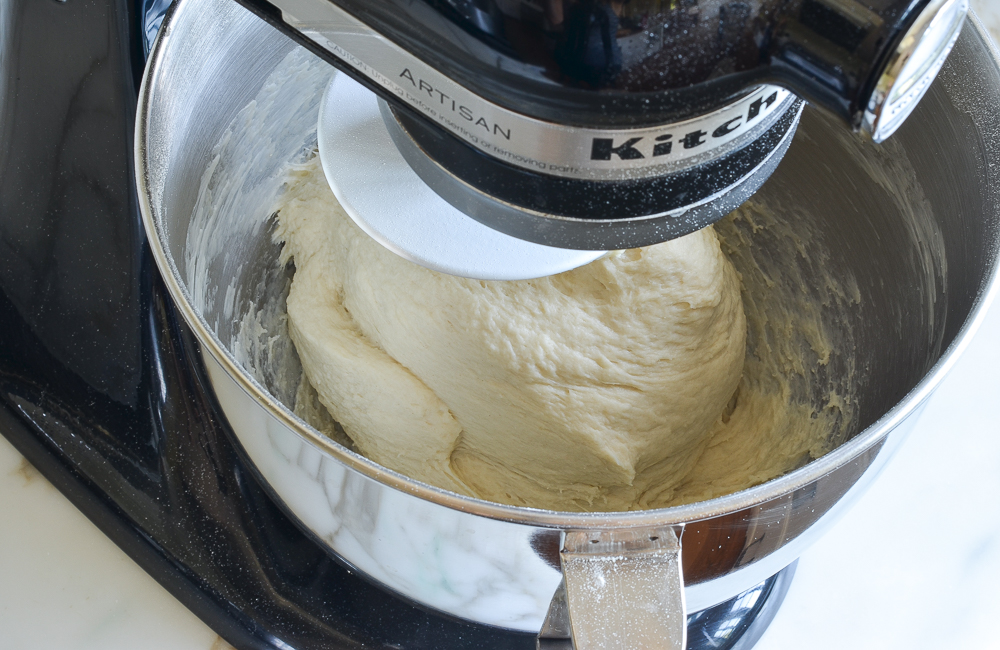
Transfer the dough to a lightly floured surface.
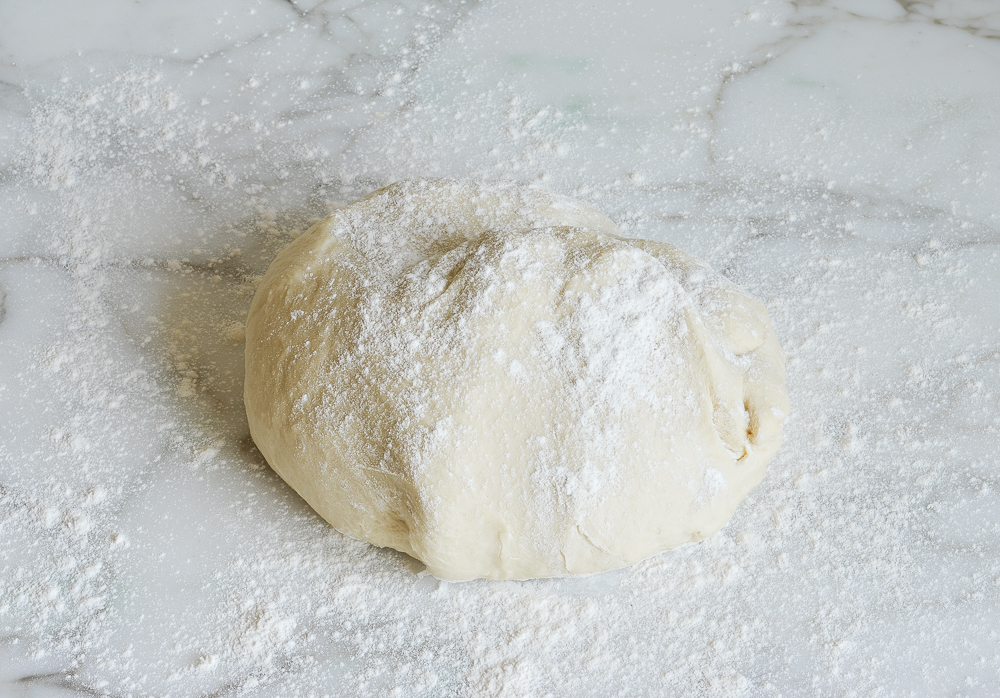 Briefly knead with your hands until it comes together into a smooth ball.
Briefly knead with your hands until it comes together into a smooth ball.
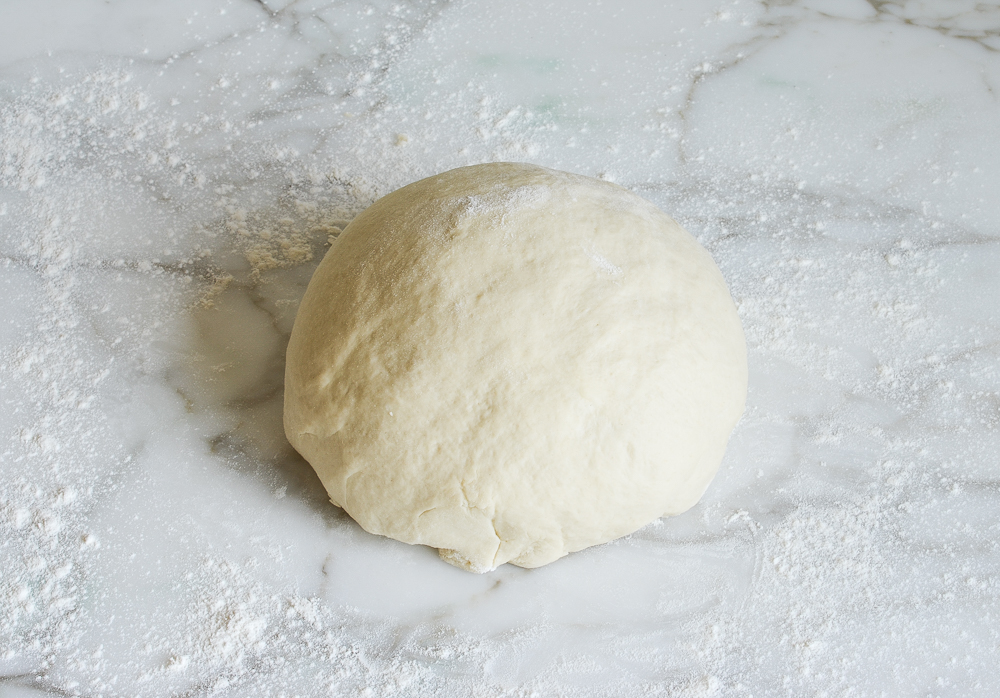
Step 2: Let the Dough Rise
Place the dough in a large greased bowl, flipping it over once so that both the top and bottom of the dough are lightly slicked with oil.
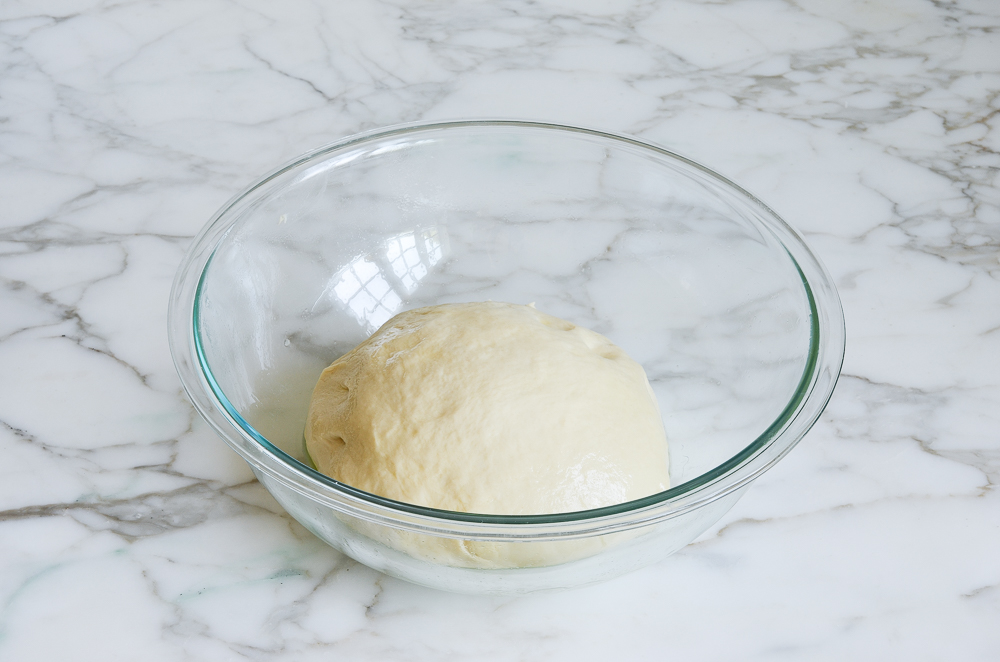
Let it rise in a warm, draft-free spot until doubled in size, 1 to 2 hours.
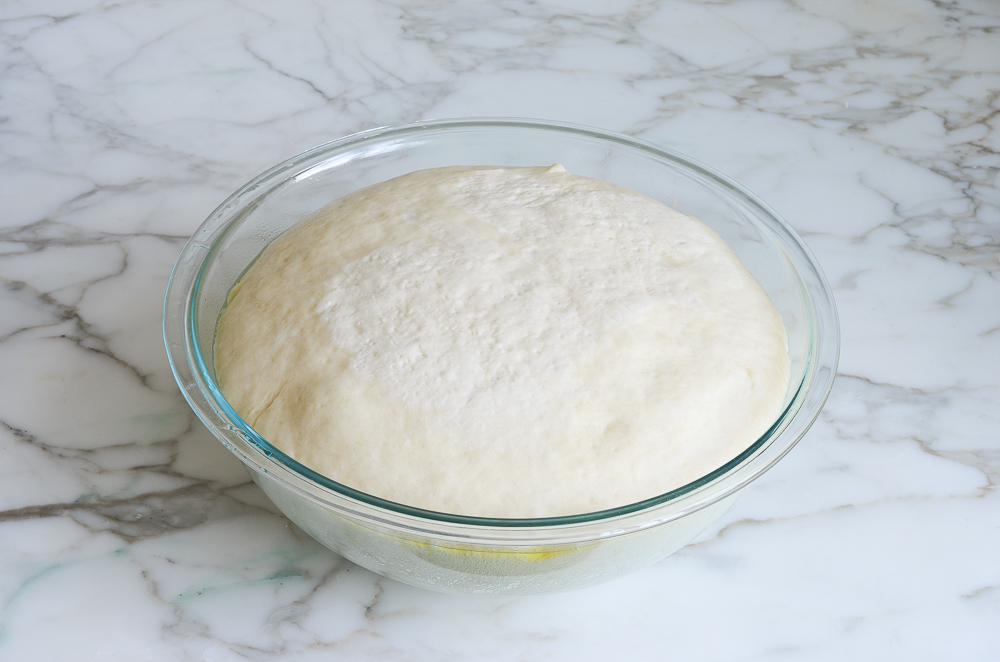
Step 3: Shape the Dough and Let Rise Again
Pour about 1/4 cup olive oil onto a 13″ x 18″ rimmed baking sheet (I know it seems like a lot, but that’s what gives focaccia its characteristic crispy bottom), then place the dough on top.
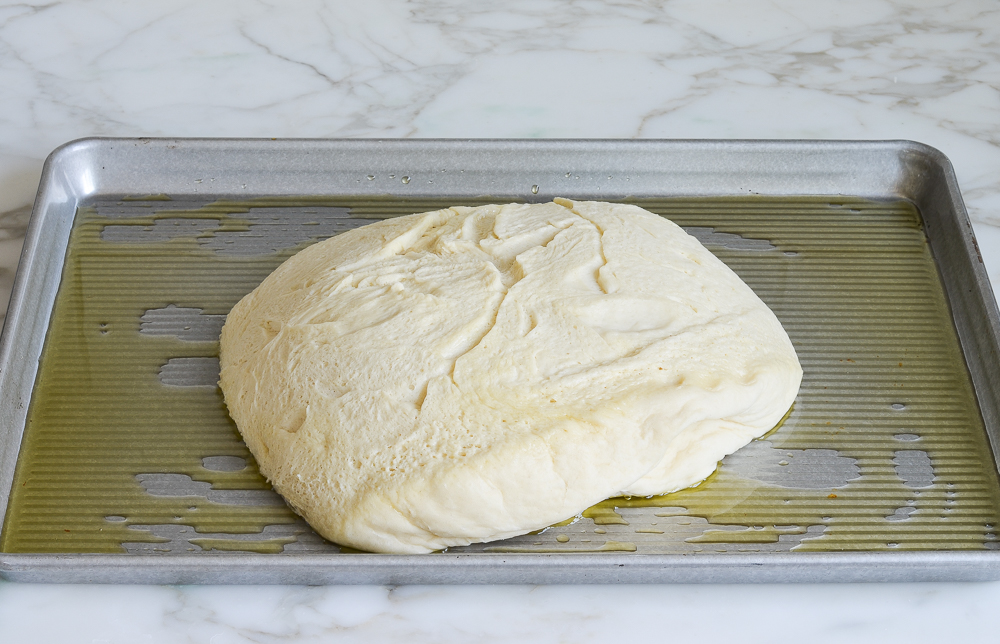
Flip it over once so that both sides are coated with oil; this makes it easier to stretch. Using your hands, spread it out to the corners of the pan.
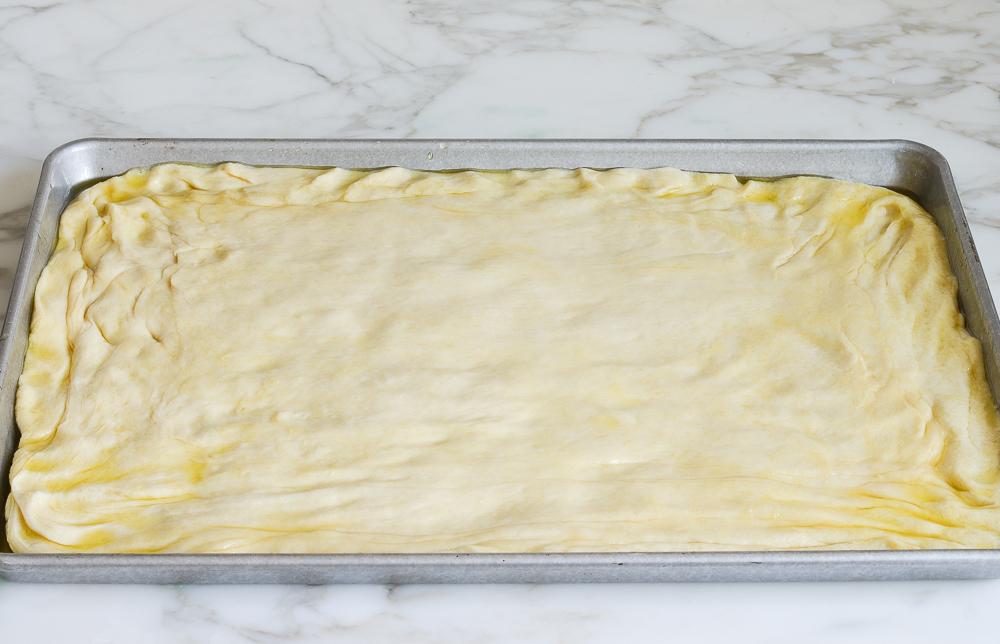
Use your fingertips to make dimples all over the dough.
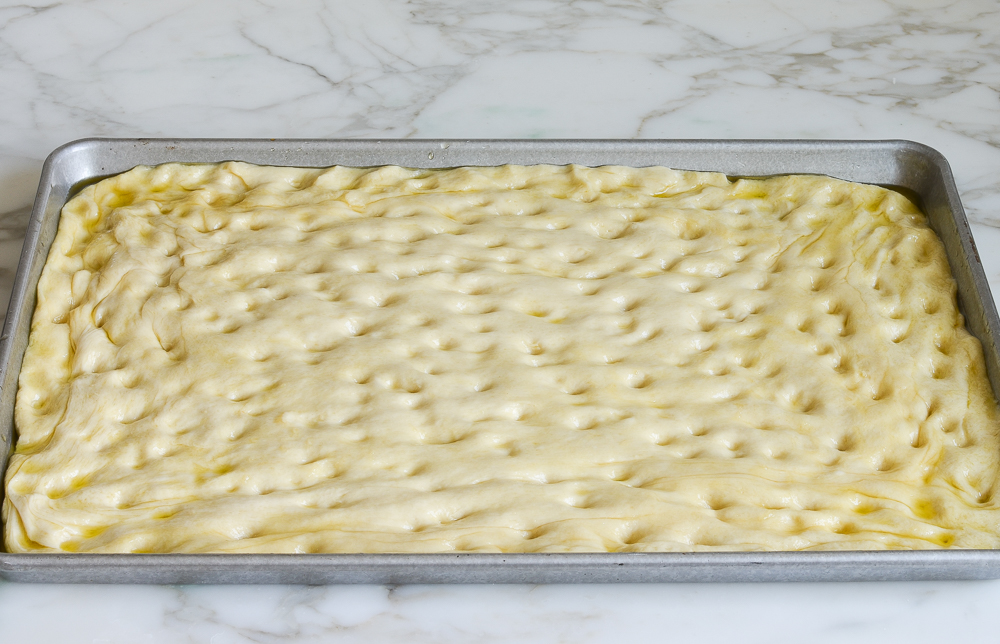
Cover the pan with plastic wrap and let the dough rise again a warm spot until puffed up and doubled in size, about an hour. Drizzle the dough with a bit of olive oil, so it pools in the dimples, and sprinkle with 3/4 teaspoon kosher salt and fresh rosemary.
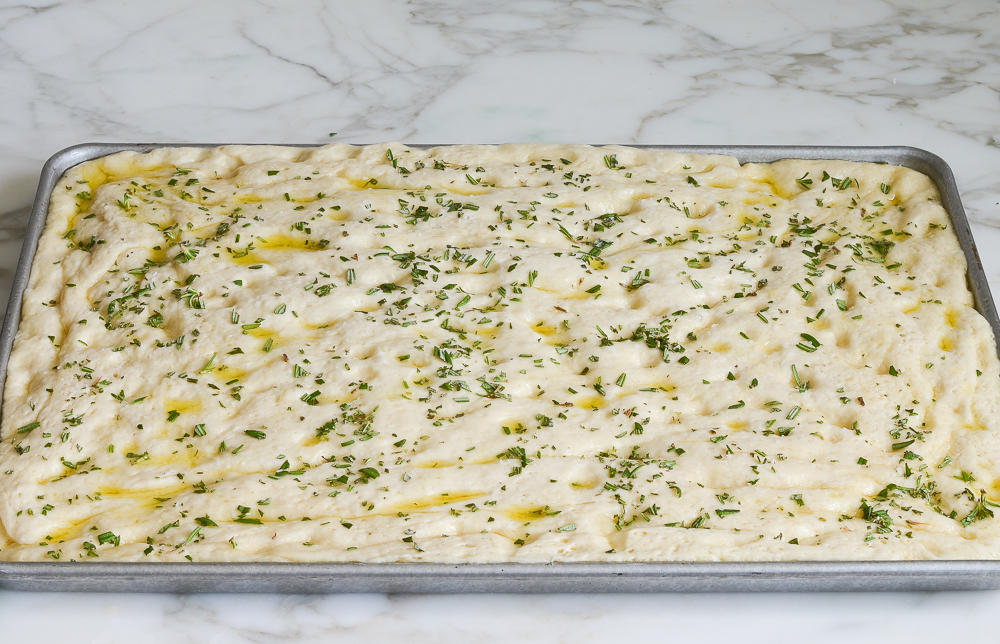
Step 4: Bake
Bake for about 20 minutes, until golden.
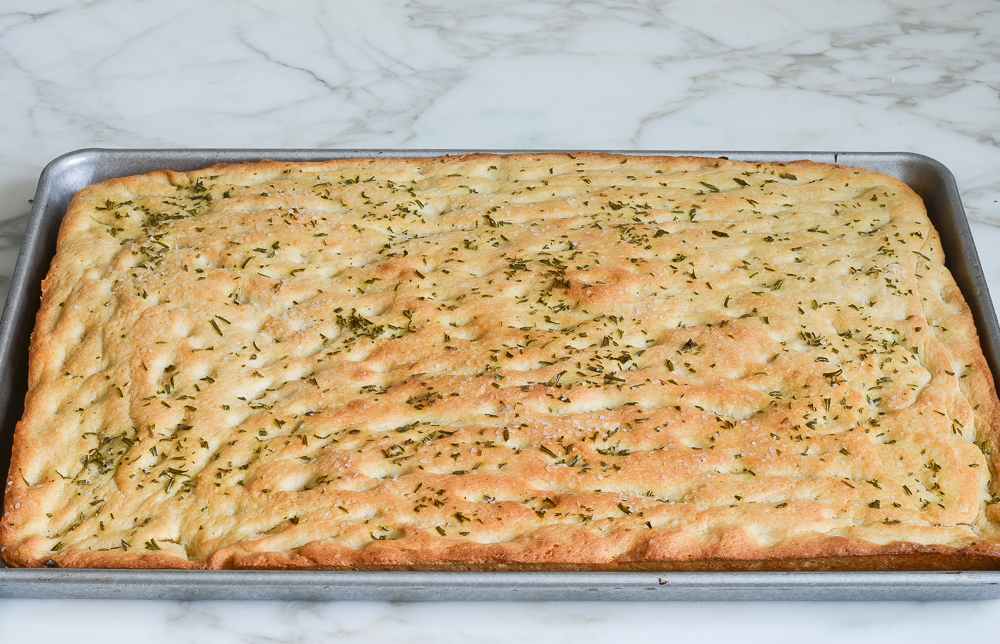
Let cool for about 15 minutes, then transfer to cutting board and slice into squares. Drizzle with a touch more olive oil if desired.
Freezing Instructions
The homemade focaccia bread recipe freezes beautifully. To freeze, cut it into portions, wrap in plastic wrap and then foil and freeze for up to 3 months. To reheat the focaccia, remove the plastic wrap and rewrap it in the foil. Heat it in a 350-degree oven for 10 minutes or until heated through.
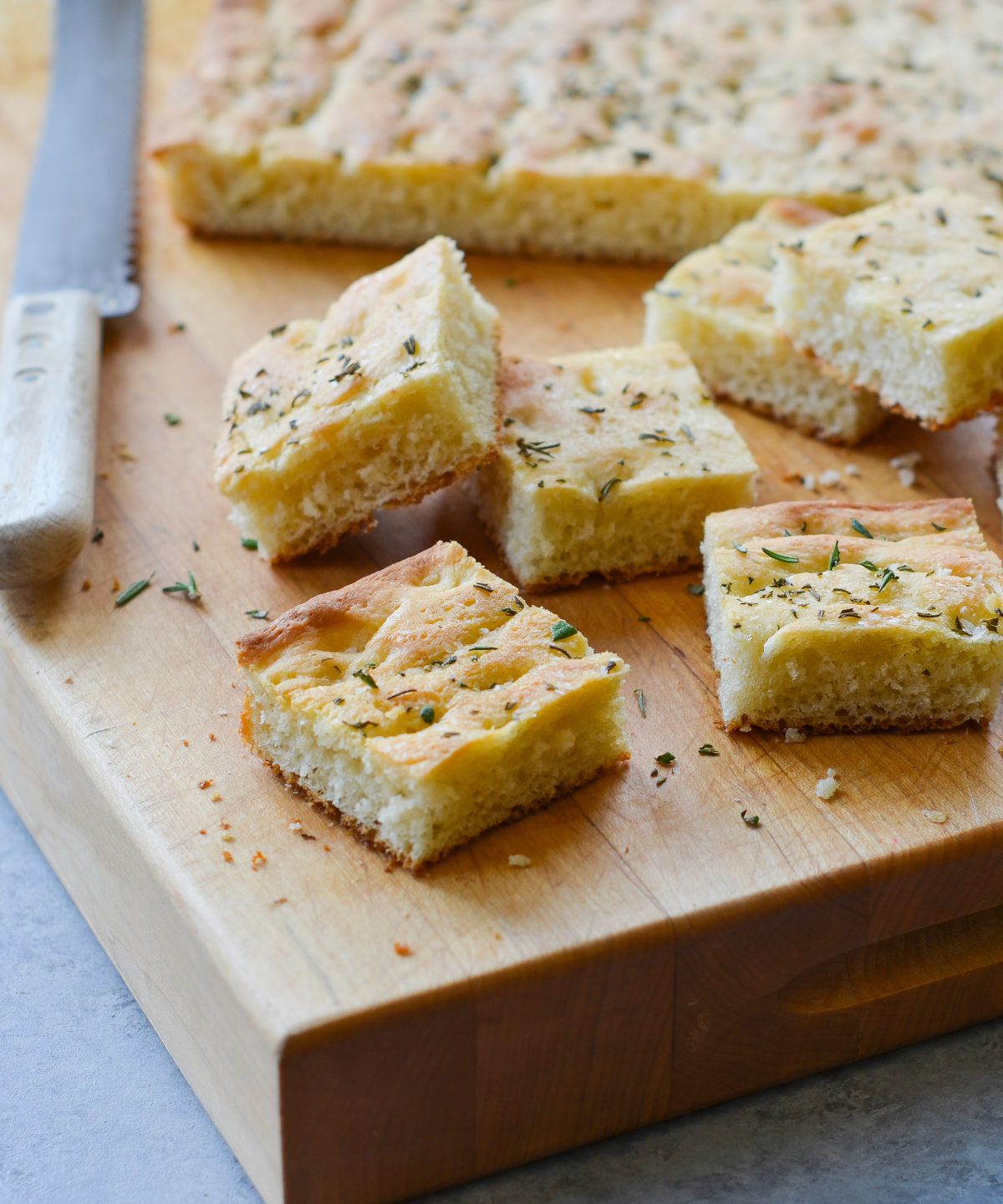
You May Also Like
Focaccia
Learn to make focaccia, the simple Italian flatbread with its signature dimpled surface and rich olive oil flavor—it’s easier than you think!
Ingredients
- 5 cups all-purpose flour, spooned into measuring cup and leveled-off with a knife, plus more for kneading
- 1 tablespoon sugar
- 1 packet (2¼ teaspoons) instant/rapid-rise yeast (see note)
- 1 tablespoon + ¾ teaspoon kosher salt, divided
- 1¾ cup warm water
- ¾ cup extra virgin olive oil, divided, plus more for oiling the bowl and drizzling on top
- 1 tablespoon chopped fresh rosemary, from several sprigs
Instructions
- In the bowl of a mixer fitted with a dough hook, combine the flour, sugar, yeast, and 1 tablespoon of the salt. Mix on low speed to combine. Add the water and ½ cup of the olive oil; mix on low speed until the dough comes together, then turn the speed up to medium-low and continue to knead for 5 to 6 minutes, until the dough becomes soft and slightly tacky. It should stick to the bottom of the bowl a bit. If the dough seems too wet, sprinkle with a few tablespoons of flour, and turn the mixer back on to knead it briefly to combine.
- Transfer the dough to a clean, lightly floured surface (it helps to flour your hands, too). Knead by hand briefly until the dough comes together into a smooth ball.
- Coat the inside of a large bowl with about 1 teaspoon of olive oil. Place the dough in the bowl, flipping once so that both the top and bottom are lightly slicked with oil. Cover the bowl with plastic wrap and put it in a warm, draft-free spot until the dough has doubled in size, 1 to 2 hours. (The warmer the spot, the faster it will rise.)
- Coat a 13" x 18" rimmed baking sheet with ¼ cup of olive oil. (It will seem like a lot, but that's what makes the bottom crispy.) Plop the dough onto the prepared pan and begin pressing it out with your hands to fit the size of the pan. Turn the dough over once to coat both sides with olive oil. Continue to stretch the dough to fit the pan. Once the dough is stretched, spread your fingers out and make impressions almost all the way through the dough (don't poke holes, just press down to the bottom of the pan). Cover the pan with plastic wrap and place in the warm, draft-free spot until the dough has puffed up and doubled in size, about 1 hour.
- While the dough is rising a second time, preheat the oven to 425°F. Set an oven rack in the middle position.
- Sprinkle the top of the focaccia dough with the remaining ¾ teaspoon kosher salt and rosemary, then lightly drizzle about 1 tablespoon of olive oil on top so it pools in the indentations. Bake until golden brown, about 20 minutes. Remove the focaccia from the oven and let it cool in the pan on a wire rack for about 15 minutes. Transfer the focaccia to a cutting board and slice into squares. Drizzle a touch more oil on top before serving, if desired.
- Make-Ahead/Freezer-Friendly Instructions: Focaccia is best eaten freshly baked but it can be made 1 day ahead of time, if necessary. For best results, wrap the focaccia in aluminum foil and place in a sealed plastic bag at room temperature. Reheat, wrapped in foil, in a 350°F oven until just warmed through, about 10 minutes. The focaccia can also be made ahead and frozen. To freeze, cut it into portions, wrap in plastic wrap and then foil and freeze for up to 3 months. To reheat the focaccia, remove the plastic wrap and re-wrap it in the foil. Heat it in a 350°F oven for 10 minutes or until heated through.
- Note: Active dry yeast may be used instead of instant/rapid-rise yeast, however, the dough will take longer to rise. To give active dry yeast a boost, you can add it to the warm water in the recipe, let it sit until frothy, about 10 minutes, and then proceed with the recipe.
Nutrition Information
Powered by ![]()
- Serving size: 2 squares
- Calories: 325
- Fat: 15 g
- Saturated fat: 2 g
- Carbohydrates: 41 g
- Sugar: 1 g
- Fiber: 2 g
- Protein: 6 g
- Sodium: 160 mg
- Cholesterol: 0 g
This website is written and produced for informational purposes only. I am not a certified nutritionist and the nutritional data on this site has not been evaluated or approved by a nutritionist or the Food and Drug Administration. Nutritional information is offered as a courtesy and should not be construed as a guarantee. The data is calculated through an online nutritional calculator, Edamam.com. Although I do my best to provide accurate nutritional information, these figures should be considered estimates only. Varying factors such as product types or brands purchased, natural fluctuations in fresh produce, and the way ingredients are processed change the effective nutritional information in any given recipe. Furthermore, different online calculators provide different results depending on their own nutrition fact sources and algorithms. To obtain the most accurate nutritional information in a given recipe, you should calculate the nutritional information with the actual ingredients used in your recipe, using your preferred nutrition calculator.

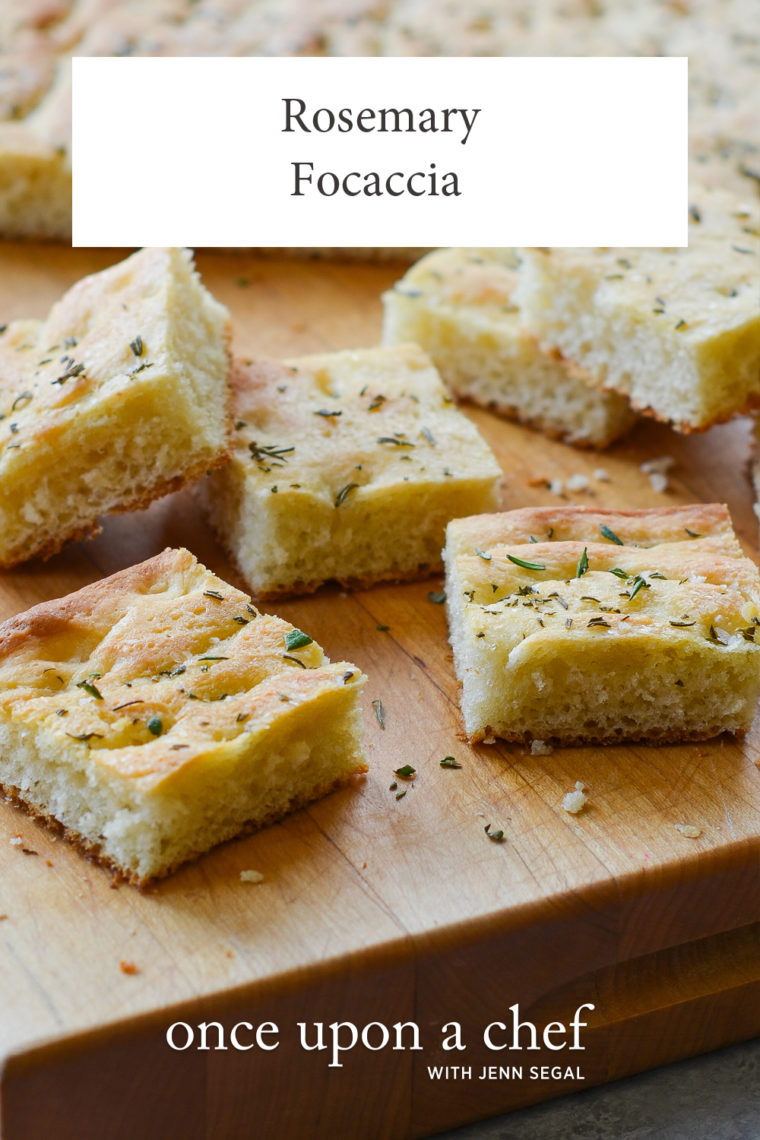
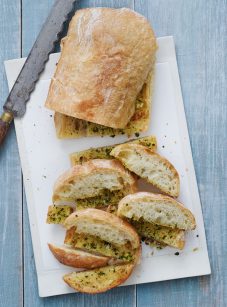
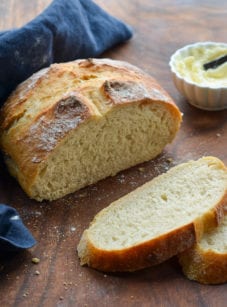
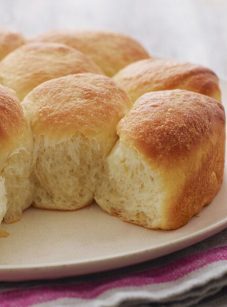
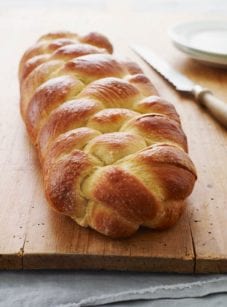
I just treated myself to a new KitchenAid mixer (my old one was a wedding gift in 1980 and missing several pieces). I saw this recipe and thought it looked like an easy project to help me get my baking feet wet. It was really fun (and stress-free) to make. I can’t eat wheat, so wasn’t able to taste it. However, my son took one bite and said, “This could be the most delicious thing I have ever eaten.” Enough said. I’d love to hear if anyone else has tried using gluten-free flour for this!
This bread is FREAKING AMAZING! Always a hit when I make it.
Question, can I do the second rise in the fridge so that I can bake this fresh in the morning? Thank you!
Sure, that should be fine (and so glad you like it)!
If I wanted to add fresh garlic to make garlic rosemary focaccia, at what stage would I add it, and how much would you recommend?
Hi Kitty, I’d sprinkle it on top along with the rosemary and olive oil. And I’d recommend 1 to 2 cloves, finely minced. Hope that helps and that you enjoy!
If never had anything but rave reviews when making this recipe, and have sent many people to this website for a copy.
This may make people cringe, but if anyone has a fruit intolerance or can’t have olive oil for some other reason, I’ve made it with canola oil with equal success.
If I wanted to cut the recipe in half and use a quarter sheet pan to bake it, how much would I adjust the baking time?
Hi Carrie, If you want to cut the recipe in half, I think this would work well in a 9 x 13-inch pan. The baking time may be a bit different (but I’m not sure by how much) so I’d keep a close eye on it.
My whole family loved it and my daughter is begging for more “felecia” bread! Your recipe is perfect! Thank you so much. This is my new go-to bread for “Italian” nights!
Used your ingredients, followed your directions exactly and it turned out perfect. Made this with a shrimp and crabmeat spaghetti, scallops and clams in white wine, and Portuguese egg tarts for dessert. My family devoured this bread dipping it into the sauces. Really easy to make and exceptional taste.
Hi,
Can this be cut in half? Tried this question before with no response, perhaps not doing it right.
Love all your recipes except Needed to doctor the asparagus soup as it was too bland.
Thanks,
L.
Hi L, Sorry you didn’t hear back after your initial question! Yes, you can cut the recipe in half if you’d like. This freezes beautifully, so you could make the entire recipe, cut it into portions and freeze some of it for a later date. Hope you enjoy!
Jenn, my previous baking experience is minimal so my expectations were minimal also, but this turned out just first-rate! Great taste, texture, and appearance. I scaled it down to 2/3 because I have a smaller baking sheet, used King Arthur unbleached bread flour, and tripled the rosemary because I love rosemary and have three enormous bushes of R. Officinalis var. ‘Tuscan blue’ in my back yard. Went exactly according to your directions and observations. Thanks a bunch!
I have taken to baking bread this year with great results but my first attempt at focaccia left me wary to try again. This recipe popped into my inbox and, since I have made several of Jenn’s recipes and they never fail, I decided to try again. Wow! Delicious. Amazing texture and a beautiful crispy crust. I did use a garlic infused olive oil and it was perfect focaccia. A great bread to serve alongside my chicken cacciatore to soak up the sauce. This is a keeper and will be a go-to for our weekly Italian night menu…